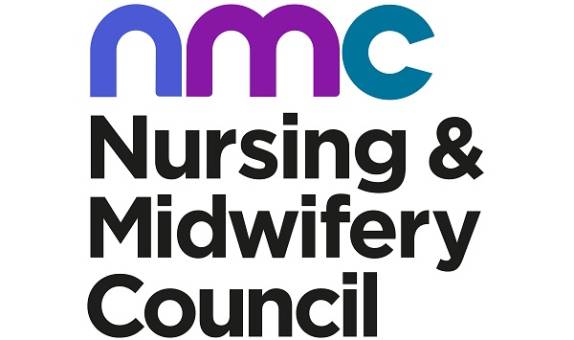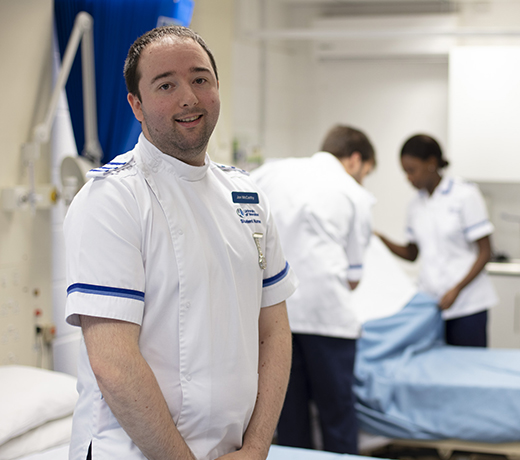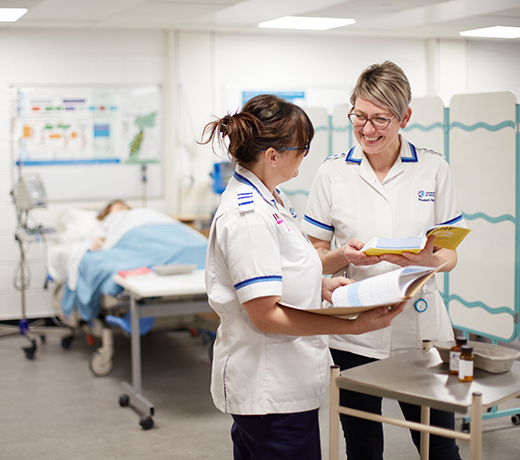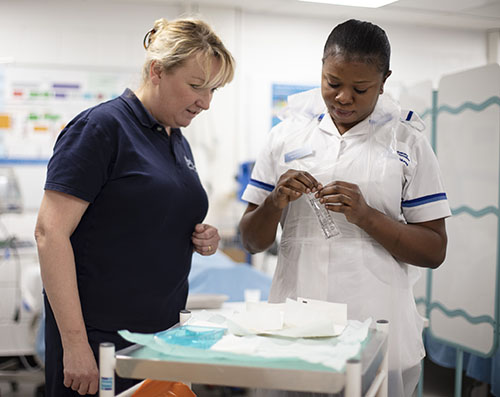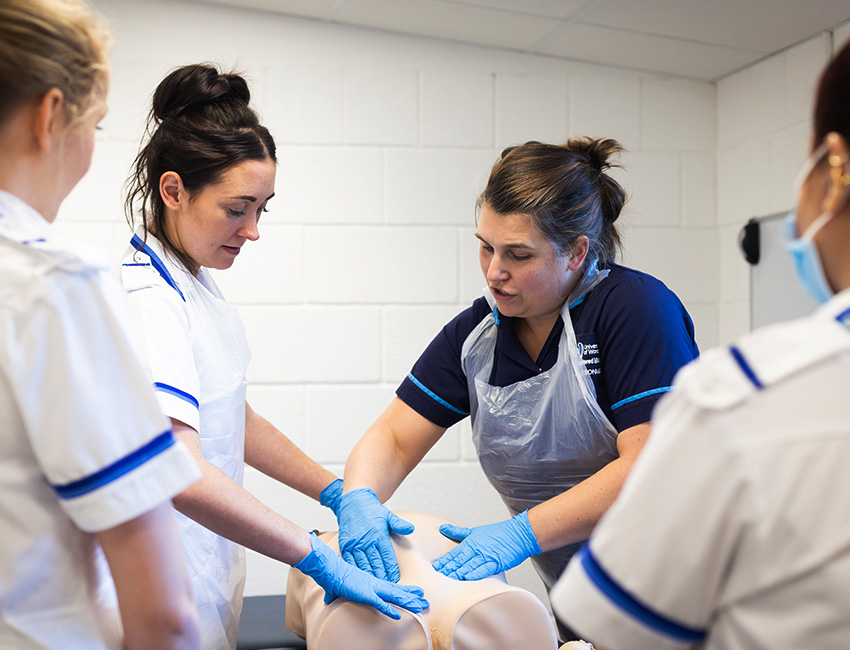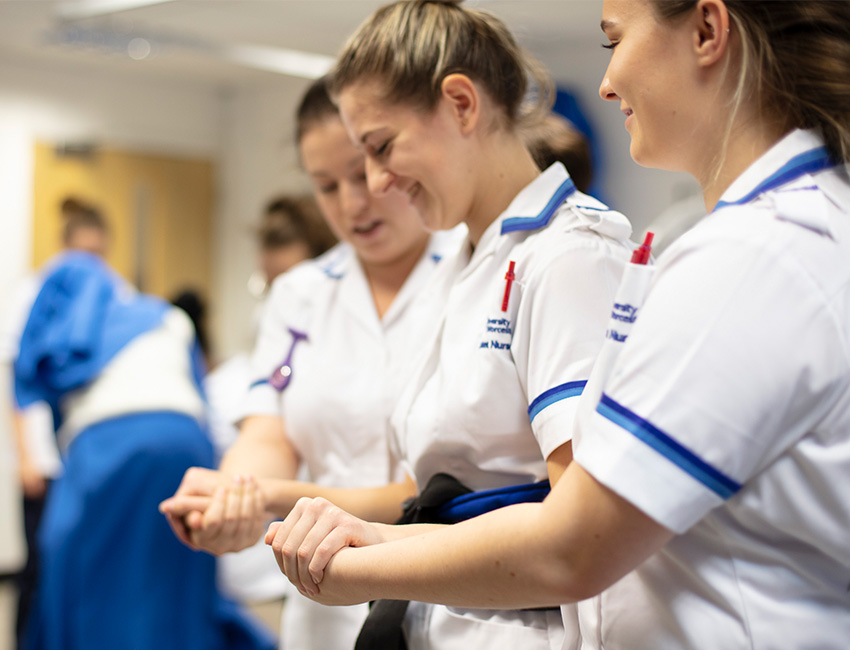Our nursing degree is split between learning on campus and developing your skills on placements across the midlands region. Throughout the course you’ll develop the clinical skills, knowledge, compassion and confidence to thrive as a registered nurse.
in the UK for Quality Education
grant that you won't need to pay back
With this degree you’ll be eligible to register as a nurse with the NMC, the professional regulatory body for nurses.
First for jobs
The University of Worcester is first in the UK for sustained employment, further study or both, five years after graduation (excluding specialist institutions) - Longitudinal Educational Outcomes Survey 2024. Read more.
Overview
At Worcester we have an excellent reputation for training registered nurses.
You'll learn to become an articulate, flexible, decision maker who is able to promote health and well-being, prioritise effective care and implement evidence-based nursing practice. Lecturers get to know your strengths and where you can develop, offering personalised support and feedback throughout your course.
When you start, you’ll also be assigned a Personal Academic Tutor. Usually this is one of the people teaching on your course and they typically remain with you throughout your adult nursing degree.
Alongside seminars, lectures and one-to-one tutorials you’ll also have lots of skills session to prepare you for placement. These hands-on sessions take place in our simulation suites, which replicate the hospital and community facilities you’ll be working in when you graduate. You’ll practice different techniques and decision making scenarios with a range of simulation manikins, and learn about person-centred care with real service users and experienced nurses.
Placements
Our aim is to arrange placements and visits to a diverse range of settings during your three years on the course, so you’ll care for a range of people, in lots of different environments. We have excellent links with NHS Trusts and healthcare providers in the region, including:
- Worcestershire Acute Hospitals NHS Trust
- Herefordshire and Worcestershire Health & Care Trust
- University Hospitals Birmingham NHS Foundation Trust
- The Dudley Group NHS Foundation Trust
- Wye Valley NHS Trust
- Gloucestershire Hospitals NHS Trust
- Shrewsbury and Telford Hospital NHS Trust
Around half your time will be spent on practice placement in each year of the adult nursing degree. Your placements run in blocks across the year, normally with experiences in at least two different placement settings each year.
While out on placement you’ll learn from experienced nurses and have lots of support from your tutors. These practical experiences, in combination with your time on campus, prepare you to be a skilled, compassionate and confident adult nurse.
Nursing in 60 seconds
Upcoming events
Course content
On this accredited course you’ll study theories backed up by substantial evidence, and then get the opportunity to apply this learning in professional practice.
Our courses are informed by the latest research and developments in the field, as well as feedback from students and employers. Therefore, modules do occasionally change to keep the course up-to-date and relevant.
All modules are mandatory to ensure you’re eligible to register as a nurse with the NMC.
Careers
This course will prepare you for registration with the Nursing and Midwifery Council, so you can begin a rewarding career in adult nursing.
Most of our graduates go on to work in the NHS – but others find positions in private practice, social services, schools, the prison service or choose to work overseas.
In your final year we arrange mock interviews and CV writing workshops, and your personal academic tutor will support with career planning. We also invite employers in the region on to campus to meet you and discuss career opportunities. Our excellent reputation in the midlands region means that most of our graduates go on to work for local NHS trusts, often securing a job before they graduate.
Opportunities
Once you’ve qualified as an adult nurse, you could choose to specialise in a certain field such as operating theatres, drug rehabilitation, care for the elderly or intensive care.
With experience you could become a nursing sister, ward manager, team leader, or move into a management role like matron or director of nursing.
With future qualifications you could become an advanced nurse practitioner, clinical nurse specialist or nurse consultant. Or you may want to move into public health, teaching or clinical research. An adult nursing degree opens up lots of possibilities.
Course highlights
Teaching and assessment
Teaching is a mix of interactive seminars, lectures, one-to-one tutorials and practical skills sessions. Your assessments will help prepare you for a career as a nurse, and include observations of professional skills, writing reflective essays, presenting, group discussions and creating a care plan.
Teaching and assessment contents
Theory:
You will be taught through a combination of interactive workshops, lectures and seminars. Case studies (developed in partnership with service users), support a scenario-based approach to learning which facilitates small group activities and discussions, leading to shared and individual problem-solving and decision-making. A campus-based curriculum design is adopted, complemented by appropriate use of both synchronous and asynchronous online learning including VLE collaborate, flipped classroom and e-learning packages, such as e-workbooks, Safe Medicate, clincalskills.net, which promote personalised engagement with learning.
All students will have a named Personal Academic Tutor for the whole of the programme. You will have opportunity to meet with your Personal Academic Tutor at four scheduled group meetings in part one to ensure you are settling into University life, to sign-post to any University services needed and to provide academic support. In parts two and three, to reflect growing confidence, a combination of individual and group meetings will be facilitated, with the expectation of three planned meetings each part. You can request at any point across your programme an individual personal academic tutorial. There will also be designated sessions provided by the Personal Academic Tutor relating to academic integrity, academic and reflective writing skills. The University places emphasis on enabling you to develop the independent learning capabilities that will equip you for lifelong learning and future employment, as well as academic achievement. A mixture of independent study, teaching and academic support from Student Services and Library Services, and the Personal Academic Tutoring system enables you to reflect on progress and build up a profile of skills, achievements and experiences that will help you to flourish and be successful. For students studying via the apprenticeship route, tripartite, 12 weekly individual progress reviews (ILPRs), involving the apprentice, their employer and a university representative, review the apprentice’s progress against the knowledge, skills and behaviours of the Nurse Degree (2018) Apprenticeship Standard. With study skills embedded into the early stages of the course to help promote your achievement and confidence with learning and assessment. Study skills are further enhanced by the delivery of academic study days, provided by the Academic English and Skills Centre, available to all students in part one.
Practice learning:
At the core of the nursing programme is learning in a diverse range of clinical placements. Learning in the real world facilitates work-readiness, personal and professional development. Mandatory practice learning equates to 50% of the programme credit for each part, with the programme weeks equally shared between theory and practice learning. Your practice learning is mapped across the programme, gradually increasing as you gain in confidence, with students progressing from 43% of the programme hours in practice learning environments in part one, to 55% in part three, supporting your transition from student to Registered Nurse. Student placements run in blocks across each part, with experiences normally in a minimum of two practice placements per part, in a setting appropriate to their field of practice. The use of ‘spokes’ (visits to alternative placement settings) to maximise learning opportunities offered by diverse and non-traditional settings, offer exposure to opportunities to care for people from across the life-span, with mental and physical health needs and learning disabilities. Enhanced practice learning days rooted in clinical practice, provide opportunities to consolidate learning, and for reflection and inter-professional learning, including added value learning experiences and seeking additional support as necessary to promote inclusive learning in the practice setting.
Students on placement are supernumerary and are supported by a practice supervisor and assessed by a practice assessor, both having undergone appropriate preparation for their roles. Students will have access to the internet and library resources whilst on placement.
You will be provided with opportunity to complete simulated practice learning activities. All simulated activities involve a range of people including students, peers, service users/carers, practitioners, technicians, academics and includes role play, ‘hands on’ practical skills sessions using a range of simulation manikins, video recording and playback. Formative feedback on performance is provided to facilitate safe and effective support for essential skills development, in simulation suites, replicating hospital and community practice learning environments. This learning is particularly important in part one, with 20 days allocated to prepare students for their practice learning experiences. This is reduced in part two and three to 10 days per part.
You will have the opportunity to complete a UK or international elective placement, during part three, semester one. This can be either a formative four-week experience or a summative experience, between 6 and 12 weeks, helping with the globalization of the programme and employability.
You will have a designated Academic Assessor for each part of the programme, in line with the NMC (2023) Part 2: Standards for student supervision and assessment.
Student story
Entry requirements
UCAS tariff points required: 112
| Qualification | Grade |
|---|---|
| A-level | BBC |
| BTEC National Extended Diploma | DMM |
| T-level | Merit |
We do accept Access to HE Diplomas and other qualifications which may not exactly match the combinations above. Work out your estimated points with the UCAS tariff calculator.
Any questions?
If you have any questions about entry requirements, please call our Admissions Office on 01905 855111 or email admissions@worc.ac.uk.
Fees
Fees contents
UK and EU students
The Government has announced that it will increase tuition fees and maintenance loans by 3.1% from the 2025/26 academic cycle. Subject to approval, the University intends to increase our tuition fees in line with this and as per our terms and conditions. This means that from September 2025 the standard fee for full-time home and EU undergraduate students on BA/BSc/LLB degrees and FdA/FdSc degrees will be £9,535 per year for new and continuing students.
For more details on course fees, please visit our course fees page.
International students
The standard tuition fee for full-time international students enrolling on BA/BSc/LLB degrees and FdA/FdSc degrees in the 2025/26 academic year is £16,700 per year.
For more details on course fees, please visit our course fees page.
How to apply
How to apply contents
Applying through UCAS
UCAS is the central organisation through which applications are processed for full-time undergraduate courses in the UK.
Read our how to apply pages for more information on the application process, or if you’d like to apply for part-time study.
Contact
If you have any questions, please get in touch. We're here to help you every step of the way.

Jodie Walker-Haywood
nursingadmissions@worc.ac.ukAdmissions Office
admissions@worc.ac.uk01905 855111More to explore
Open Days
Visiting us is the best way to get a feel for student life at the University of Worcester.

The City of Worcester
Worcester is a welcoming university city with great transport links and plenty of student parking.

Accommodation
Benefit from our accommodation guarantee. We have rooms on campus to suit every budget including en-suite options.


